How to Build Topical Authority in WordPress With 10 Strategies
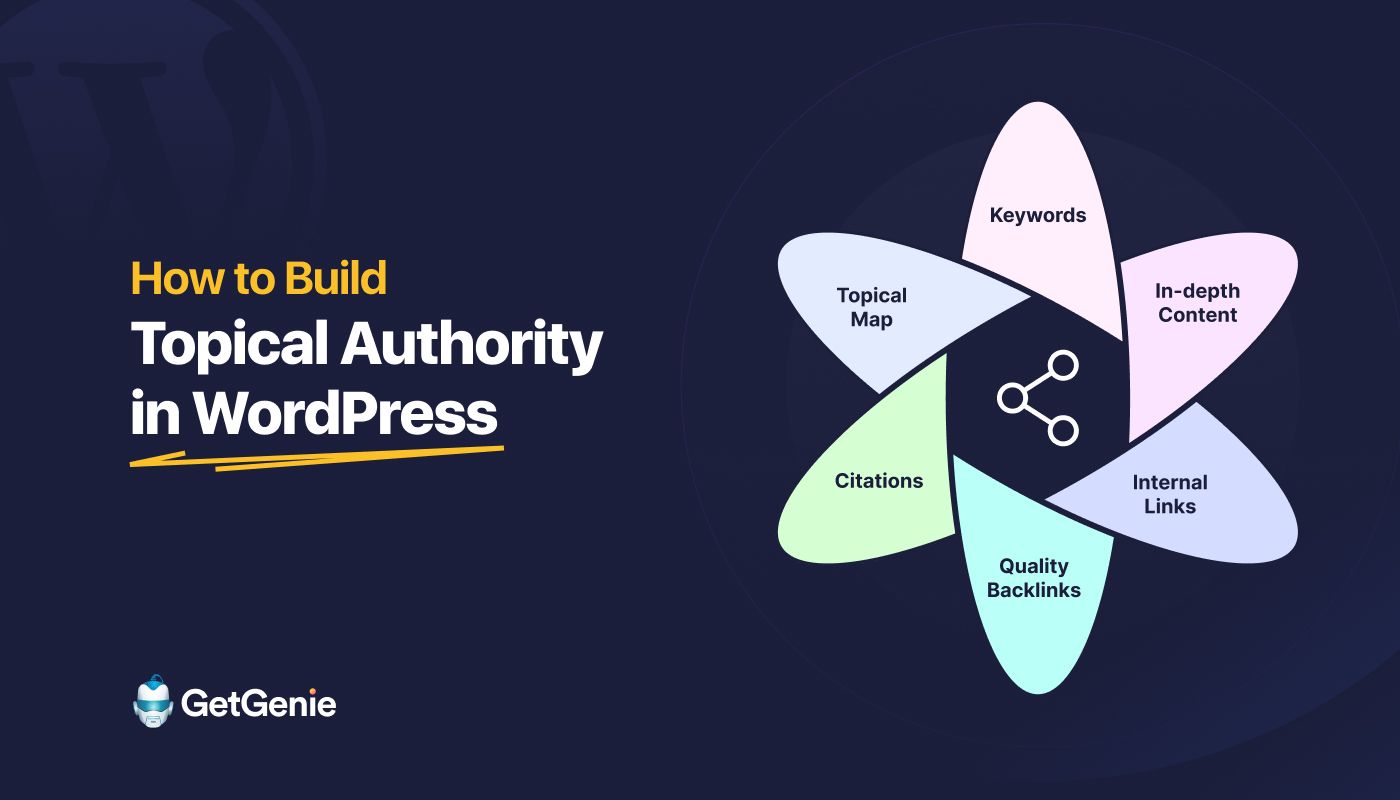
You are confident that your content is good. But why do your competitors dominate Google search results? Why do they attract backlinks, subscribers, and traffic? You’ve done everything, you’ve published consistently, but why are you still behind?
The difference often comes down to one thing. It’s a topical authority.
According to a 2024 Semrush study, websites demonstrating strong topical authority earned over 67% more organic traffic and 52% higher engagement rates. Ahrefs revealed that 90% of web pages get no organic traffic due to poor relevance and authority.
So, how can you position your site as a trusted source that Google and your audience can’t ignore?
This guide will reveal the secret to getting a high topical authority. There are 10 strategies anyway, and you shouldn’t miss even one strategy.
It’s all about Topical Authority, Google’s signal of expertise and trust.
Here’s what you’ll learn in this guide:
✅ What topical authority really means in SEO
🔍 How to choose a focused niche and target audience
🧭 Ways to build topic clusters and pillar content in WordPress
⚙️ How to optimize for E-E-A-T and search intent
🔗 Proven tactics to earn quality backlinks
📈 How to track, measure, and refine your authority growth
Follow these 10 actionable strategies to make your WordPress site a go-to expert in your niche.
What is Topical Authority?
Topical authority refers to the level of expertise, trust, and credibility a website on a specific niche. This means that your website is recognized by search engines and visitors as a source of reliable information.
Additionally, topical authority is a result of a strategic process that includes:
- Topic clusters and pillar pages
- Semantic SEO and keyword mapping
- Internal linking structure
- Content quality and depth
- External recognition
- E-E-A-T principles
For example, when you search the keyword “best AI tools” in Google, the engine will provide lists of websites.
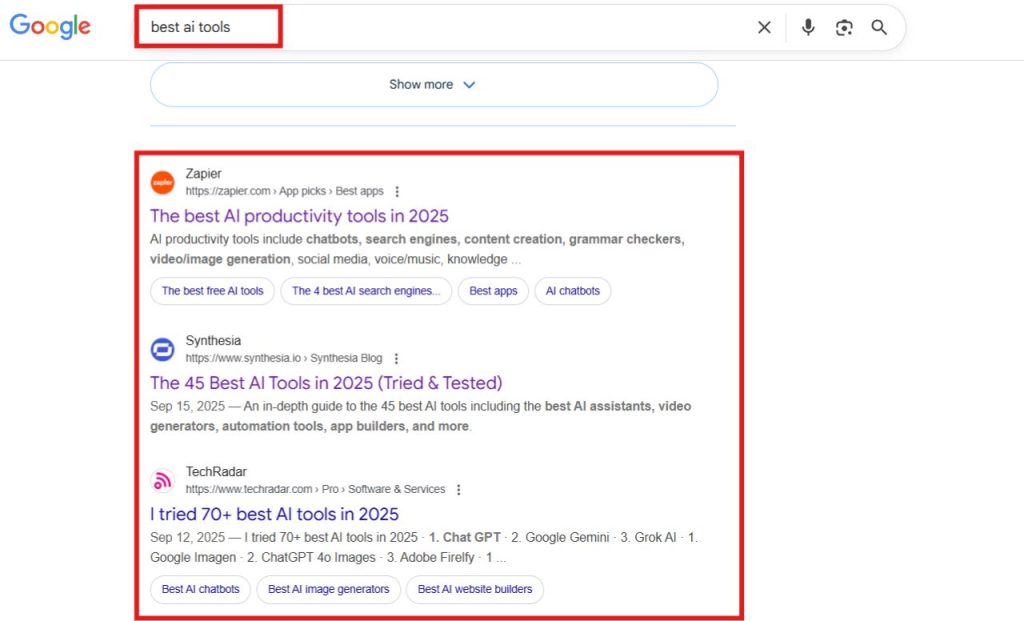
These websites don’t mean that they have high topical authority for the keyword. You can utilize a tool like Semrush to determine if these websites have high topical authority. Using the keyword overview feature of Semrush, enter the keyword and the website domain.
Based on the image below, synthesia.io has a moderate authority for the keyword. This means that Synthesia.io has built some recognition and content depth, but cannot be considered an expert source.
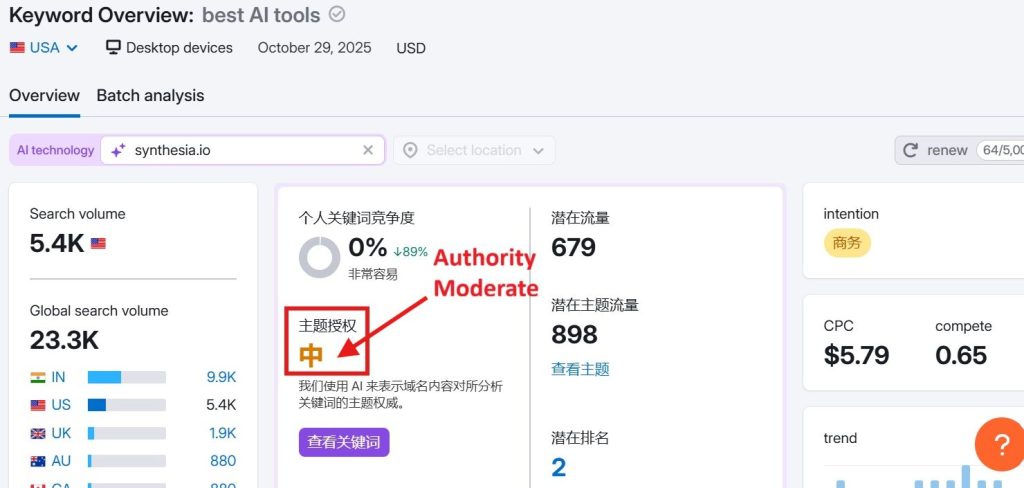
Why Topical Authority Matters in your SEO?
Having strong topical authority boosts search performance because Google tends to trust authoritative sources and rank them higher in its search results (SERPs).
Here’s a detailed explanation of why it really matters in SEO:
1. Enhances Link Building Opportunity
Building topical authority also encourages natural link building. This happens when the other website has linked your website to their content.
For example, website xyz has content about “Plant-based Nutrition in Singapore,” and they saw your website that discussed “The Complete Guide for Plant-based Nutrition in 2025.” Website xyz found your content as a very good source to back their content, so naturally, they would check your topical authority. If your website has a high authority, website xyz would surely link to your content.
Now, website xyz has been added as your backlink. Backlinks signal search engines that your content is reliable and worth ranking. In other words, every quality link strengthens your site’s credibility in Google’s eyes.
That’s why pages with numerous high-quality backlinks, especially from trusted sources, tend to achieve higher rankings in search results.
2. Increased trust and credibility among readers and search engines.
A website that has high-quality and in-depth content and presents accurate information can gain trust and credibility from readers.
For instance, a visitor searched “Plant-based Nutrition in Singapore” and opened a source from the list of sources Google provided.
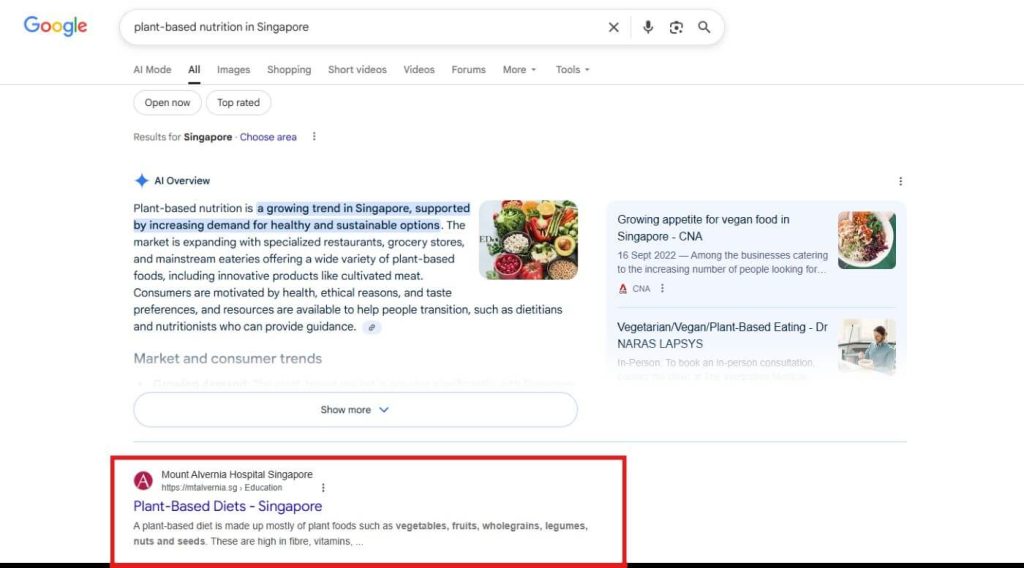
When the user finds that it provides accurate and sufficient information, citations, reviews from experts in the nutrition field, presented case studies, and even contains links from different websites that support the claim, the user will identify that website as a go-to source of information. The user will most likely revisit the site.
3. Aligns with Google’s E-E-A-T Guidelines
Topical authority is deeply connected with E-E-A-T framework. This principle guides Google on how he evaluates the quality and reliability of the contents.
Topical authority supports each pillar of E-E-A-T:
Esperienza
Google values content showcasing practical insight and not on opinion or guessing. These are contents like tutorials, case studies, and reviews based on first-hand knowledge.
Competenza
This demonstrates a deep understanding and skills in a chosen niche. This means that you are not only consistently covering the main topic of your niche, but also covering in depth and with accuracy on related subtopics. Also, you have supporting credible data, research, and citations supporting your claims. That signals Google that you are a subject matter expert.
Autorevolezza
It refers to how others recognize your credibility. For example, when other websites link your content to their own content. This means that others recognize your content as a source od credible information.
Affidabilità
This is where search engines like Google recommend your content to users. This means that Google finds your content with reliable information, with citations, publications, reviewed by a licensed expert, etc.
The Difference Between Topical Authority and Domain Authority
There are 2 types of authority in SEO, autorità topica E domain authority. While they may sound similar and both play key roles in SEO, they are not the same.
Topical authority showcases your expertise within a specific subject area, while domain authority reflects the overall strength and credibility of your entire website.
| Metric | How It’s Earned | Esempio |
|---|---|---|
| Topical Authority | Through comprehensive, high-quality content | A WordPress blog that ranks for all “WordPress SEO” topics |
| Domain Authority | Through strong external links and brand recognition | A popular site like HubSpot |
In short, DA measures popularity, while topical authority measures expertise.
How to Build Topical Authority in WordPress
Now that we understand what topical authority is, let’s look at 10 proven strategies you can apply directly within WordPress to build it.
1. Choose a Clear and Focused Niche
Before you write a single post, define your niche. Avoid being a generalist as Google rewards in-depth content. For example, a WordPress site about “fitness” is too broad, but “strength training for women over 40” is a more targeted and easier-to-dominate niche.
The best way to determine your niche is through conducting thorough audience research. You can start by defining the field you want to work with. For example, you can focus on health and wellness.
2. Identify Your Target Audience
Next, analyze your target audience by asking yourself these questions:
- Who do you want to help or reach?
- What specific problems do they face?
- What are their goals, habits, and frustrations?
Then use buyer personas to visualize your ideal audience. Each persona should include details, like demographics (age, gender, location), profession or lifestyle, pain points, aspirations, and where they spend time online (social media, forums, etc.)
Lastly, visit different platforms where your potential audience interacts, such as Reddit, Facebook Groups, Quora, LinkedIn Discussions, and Twitter/X threads. Look for questions that are being asked repeatedly, as they could be niche opportunities.
3. Conduct Deep Keyword and Topic Research
Topical authority comes from relevant, high-quality, and search-optimized content you publish. To grow beyond your initial topics, you’ll need steady data-driven content ideas.
You can use tools like GetGenie directly in WordPress to identify topic clusters. You can focus on core topics (broad themes you want to rank for) and supporting keywords (long-tail variations and subtopics).
Using the GetGenie keyword research feature, you can find the related keywords, NLP, and Semantic keywords of your seed keyword.
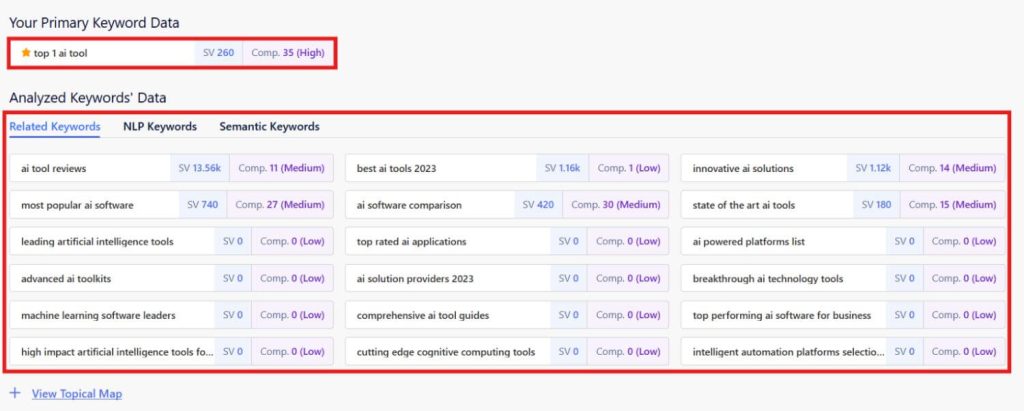
Moreover, you will know the search volume and keyword difficulty of your main keywords as well as the related, NLP, and Semantic keywords.
Remember, don’t chase keywords individually. Build a topic map that connects related ideas and search intents.
Using the same tool, you can create a topical map out of the given keywords.
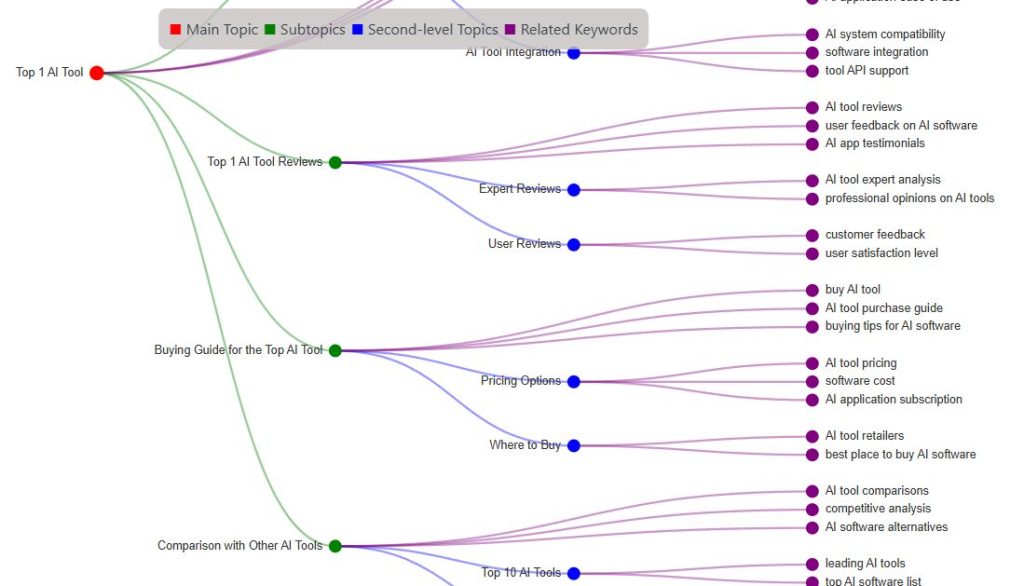
4. Create Pillar and Cluster Content
Now that you have already created your topical map, it’s time you plan your cluster contents. Strength Training for Women over 40 is your pillar topic. Then support it with cluster topics that dive into subtopics.
For example, you can create content for “Benefits of Strength Training for Women Over 40”, “Strength Training Program for Women Over 60”, etc. When writing for cluster topics, make sure that you incorporate the related keywords.
Next, choose the most suitable content format for your topic cluster:
- Guides: These provide comprehensive coverage of a particular subject.
- What is: In-depth explanations that define and clarify a specific concept or question.
- How to: Step-by-step tutorials that walk readers through completing a specific task.
Remember to connect your pillar posts with cluster posts through internal linking. Each cluster topic should redirect to your main topic. For example, when you write content about “Strength Training Program for Women Over 60”, make sure that you link this content to your pillar topic, which is Strength Training for Women over 40.
5. Optimize for Search Intent and E-E-A-T
E-E-A-T is a key concept in Google’s Search Quality Evaluator Guidelines. It represents the core qualities that Google looks for when determining how reliable, accurate, and valuable a piece of content is.
To optimize your content for E-E-A-T, make sure that you display author bios and credentials and link to reputable external sources. Also, keep your WordPress “Di” and “Contact” pages transparent, and lastly, update your older posts regularly to maintain freshness and current information.
Additionally, search intent is a crucial factor to achieve better topical authority. Whether your visitors are looking for information, a product, or a solution. For instance, if your visitor is looking for a guide, make sure that your content provides a how-to or a tutorial.
Take note that if the content matches to user intent, you are reaching the right audience and converting visitors into customers.
Here are the clues to properly identify user intent:
- Words like “how,” “Che cosa,” “guide,” “tips” → Informational intent
- Words like “buy,” “discount,” “order,” “price” → Transactional intent
- Words like “best,” “superiore,” “vs,” “review” → Commercial investigation intent
- Brand or website names → Navigational intent
6. Earn Quality Backlinks
Backlinks remain a strong ranking factor. However, never get the misconception that the more backlinks your website has, the chance to get better authority. In topical authority, relevance matters more than volume.
To earn quality backlinks, make sure that you follow these proven tactics:
Guest posts on niche-relevant blogs – you can reach out to relevant websites and ask to link your website to their website.
Find broken links from relevant websites – once you already know the other websites that have relevance to your content, audit their website and find the broken links. In that way, you can ask them to use working links from your website. You can use tools like Screaming Frog SEO Spider to pull the broken internal and external links. This tactic is a win-win method.
Find the websites with unlinked brand mentions – When other websites mention your brand but without a hyperlink is called unlinked brand mentions. This happens sometimes as they tend to forget to add your link.
Once you identify those websites, you can politely reach out to them and ask them to include your link.
To spot these opportunities quickly, use the Media Monitoring tool in Semrush’s Social Toolkit. It alerts you whenever your brand is mentioned online, helping you identify unlinked mentions and turn them into valuable backlinks.
7. Maintain Consistency and Depth Over Time
Topical authority is built gradually. So, publish relevant and in-depth content regularly. This signals both visitors and Google that your site is active, dedicated, reliable, and a very good source of information.
For example, your website is about health and fitness. You will need to publish content about nutrition tips, health guides and trends, Q&A, workout plans, etc, to create well-linked articles. You can create a calendar that guides you when to publish new content.
Additionally, it is important that you update your old content with the current information, new trends, data, and statistics so that your content will remain relevant.
8.Diversify Your Content Formats
Of course, text content alone is not really sufficient to achieve a better authority. You can also add videos, a podcast (embed YouTube or Spotify content), infographics you can create from Canva or any tool, and downloadable resources like checklists or PDFs.
For example, if your content is about a tutorial (how-to), adding a video will make your content very informative. Video is the best way to present a step-by-step process and for complex topics.
Also, when presenting data in your content, infographics will make your readers easily understand the information.
Remember that diverse content keeps readers engaged and signals expertise through the depth of multimedia.
9. Promote and Engage
Your strategies to build your topical authority don’t stop at publishing quality content. You need to promote your WordPress content across different platforms and channels. Share your content on social media platforms through a social share plugin like WP Sociale.
Additionally, engage in relevant forums or communities like Reddit, Quora, Medium, LinkedIn, and Facebook groups. You can use an email newsletter with the help of plugins like Kit e-mail to nurture your audience.
The more your content gets discussed and shared, the stronger your perceived authority becomes.
10. Measure and Refine
Finally, track what’s working. You can use tools like Semrush to help you assess your website’s credibility and level of expertise on a specific topic.
Using the keyword “Strength Training for Women over 40,” SEMrush shows that its topic authority is “Relevance.”
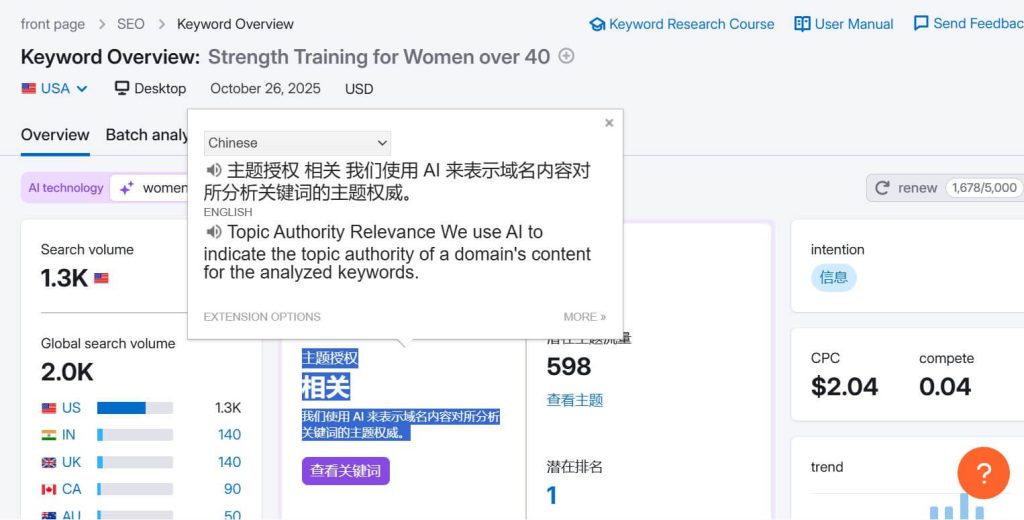
The result will tell you if your strategy is working or needs enhancement. Also, take note that the difficulty level of your keyword is a factor that affects topic authority. The higher the percentage, the more difficult it is to rank.
If the result shows that your topical authority is low, that means that your strategies are not effective. You need to revisit and refine your strategies until you become an expert in your chosen niche.
Get Started Building Your Topical Authority
Building topical authority in WordPress requires comprehensive planning and patience. It’s not a quick win, rather, it’s a long process and a demanding investment. But with these ten strategies and a strong commitment to your goal, you’ll have a WordPress site that not only ranks but also earns lasting trust.
But of course, it requires the help of different plugins like GetGenie, Semrush, etc. So, what are you waiting for? Start building your topical authority and leave a comment if you need help.

